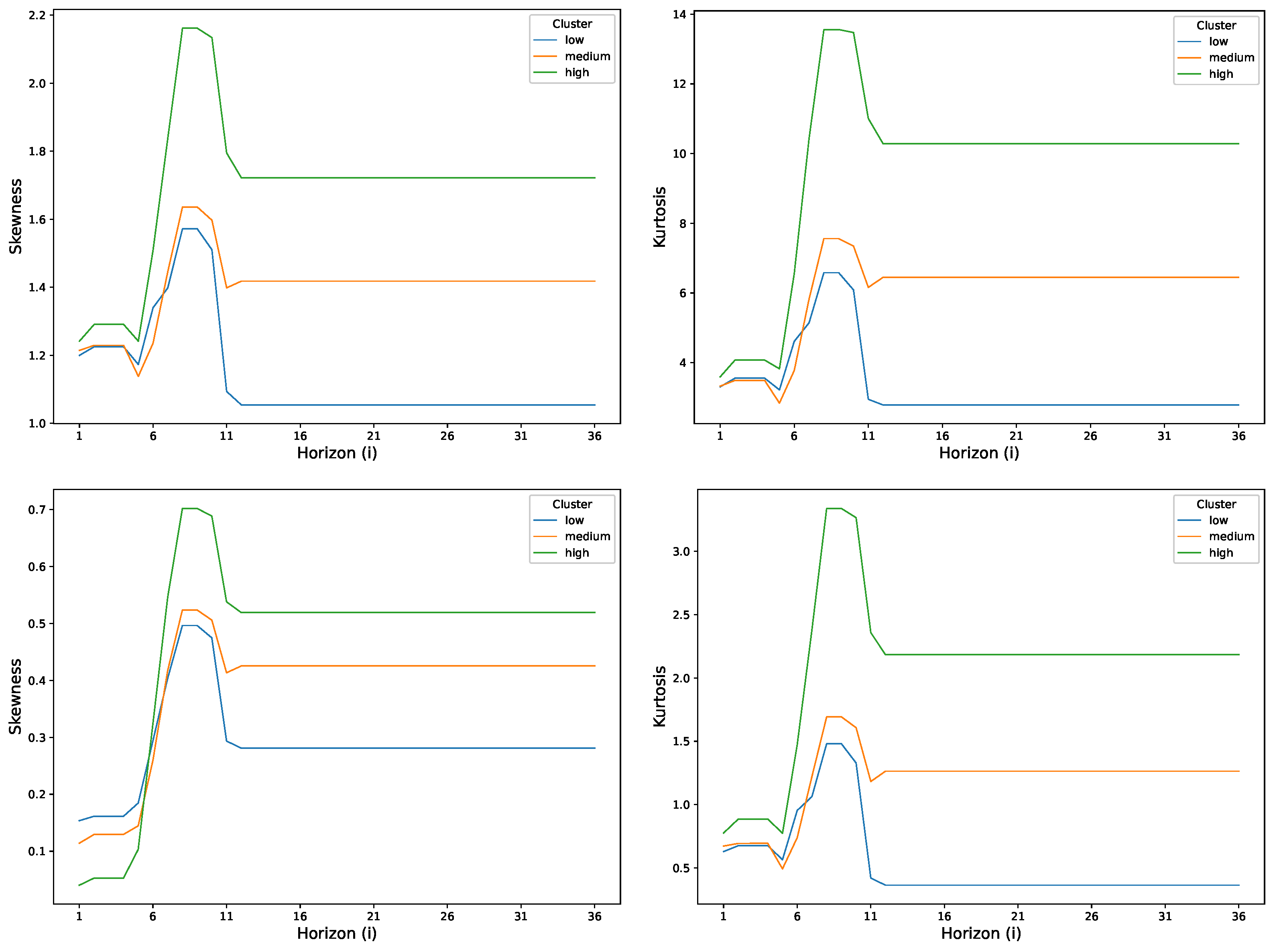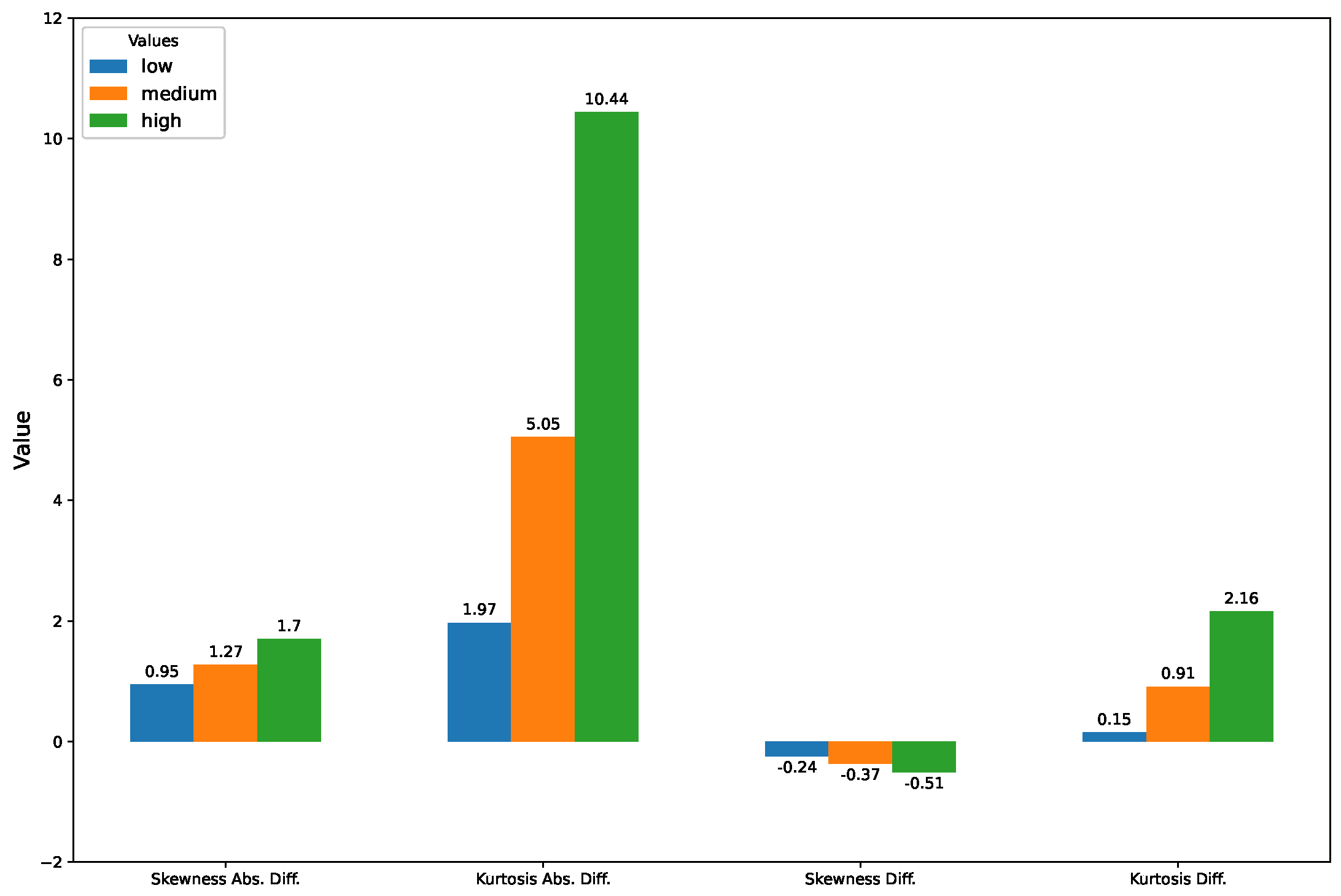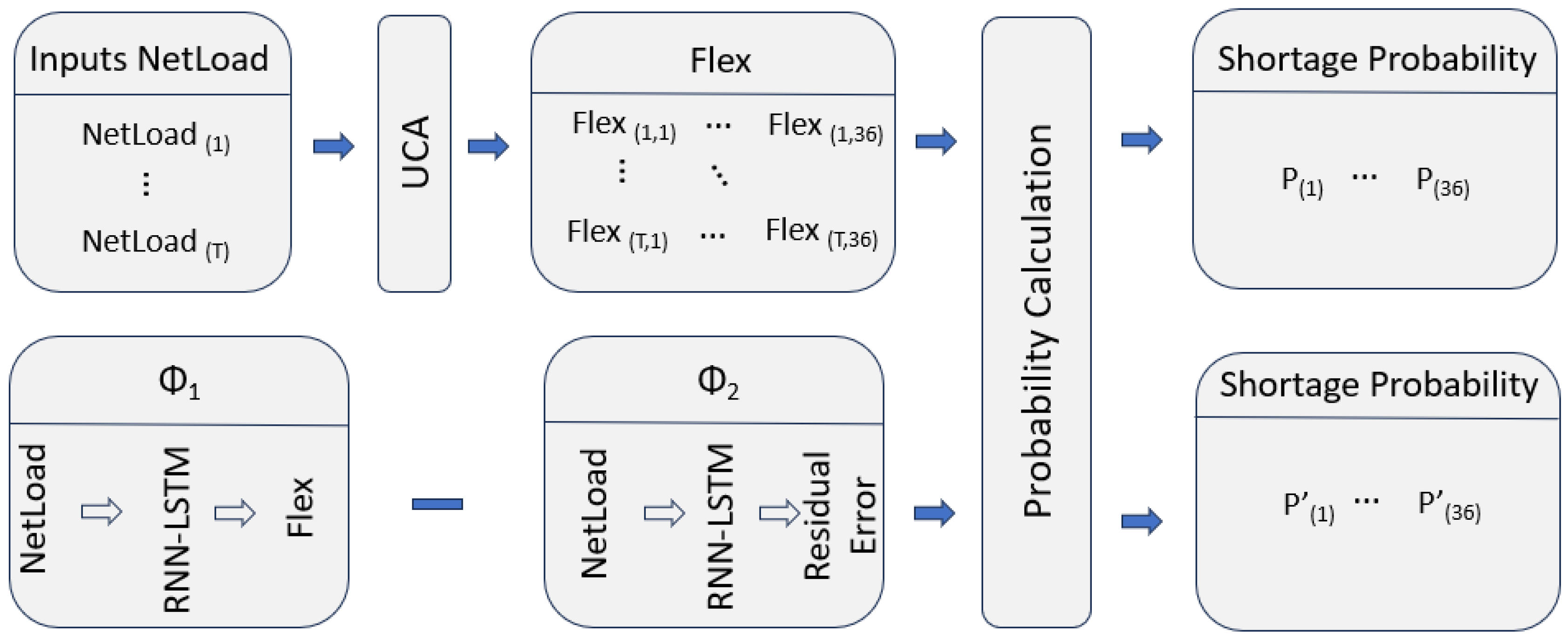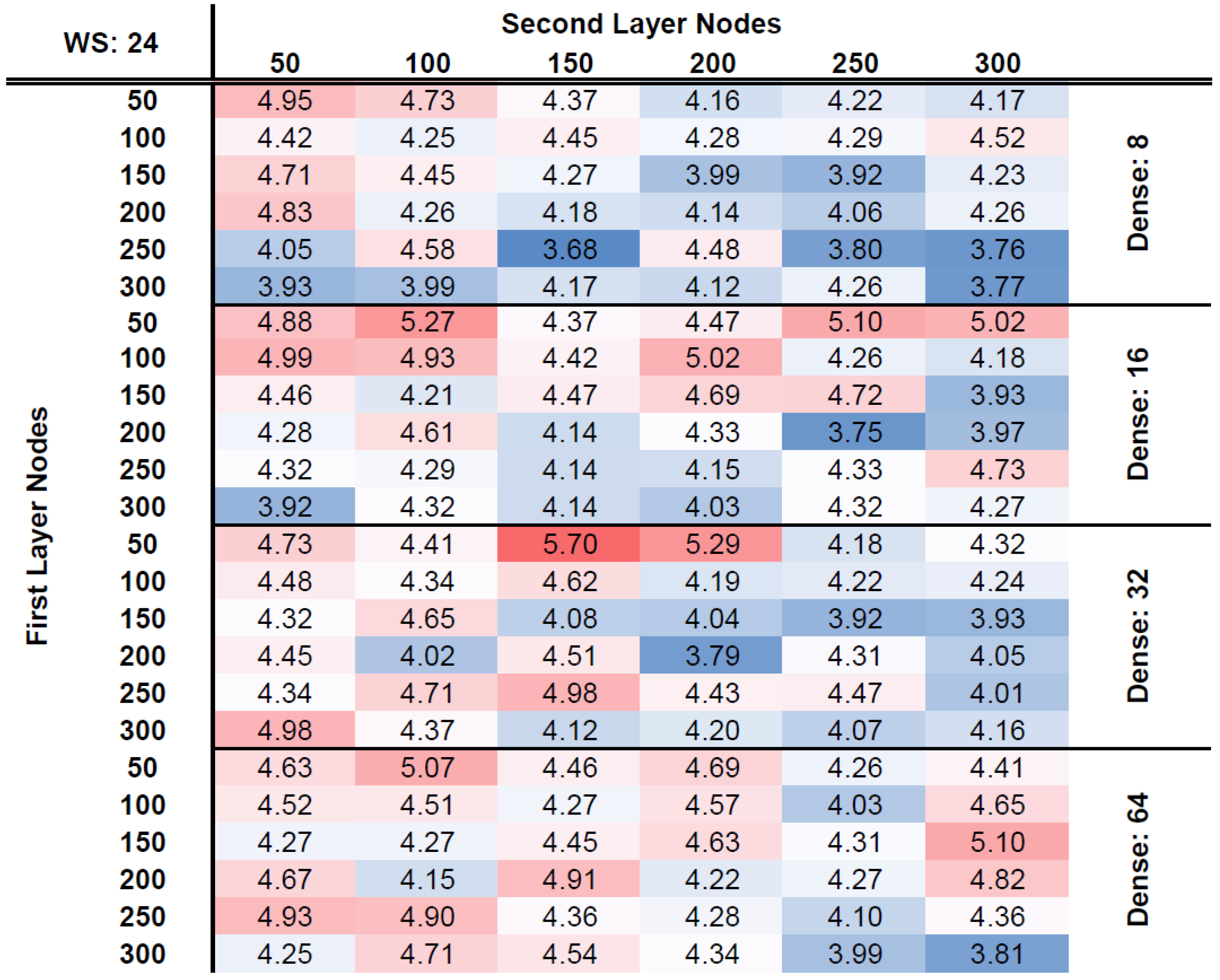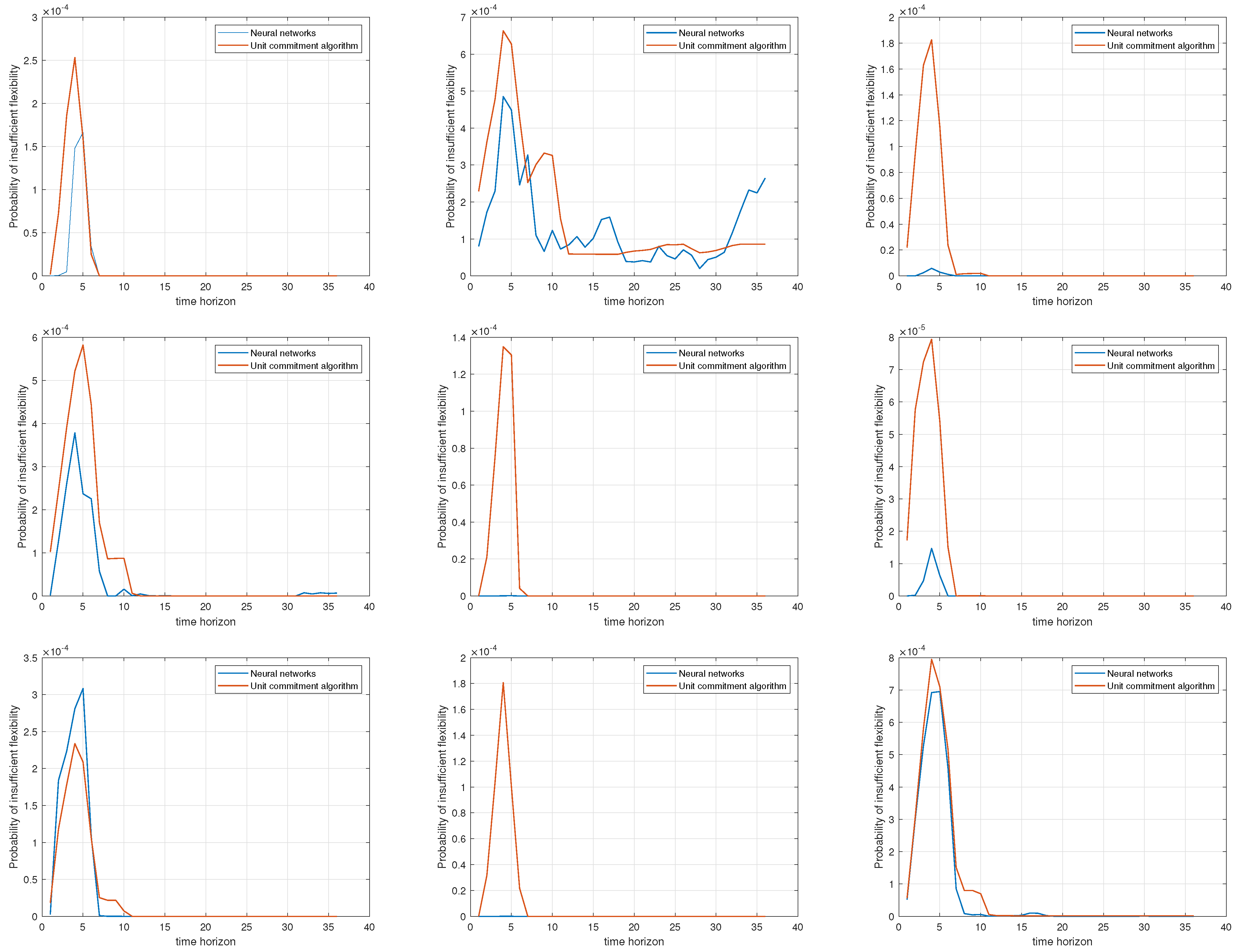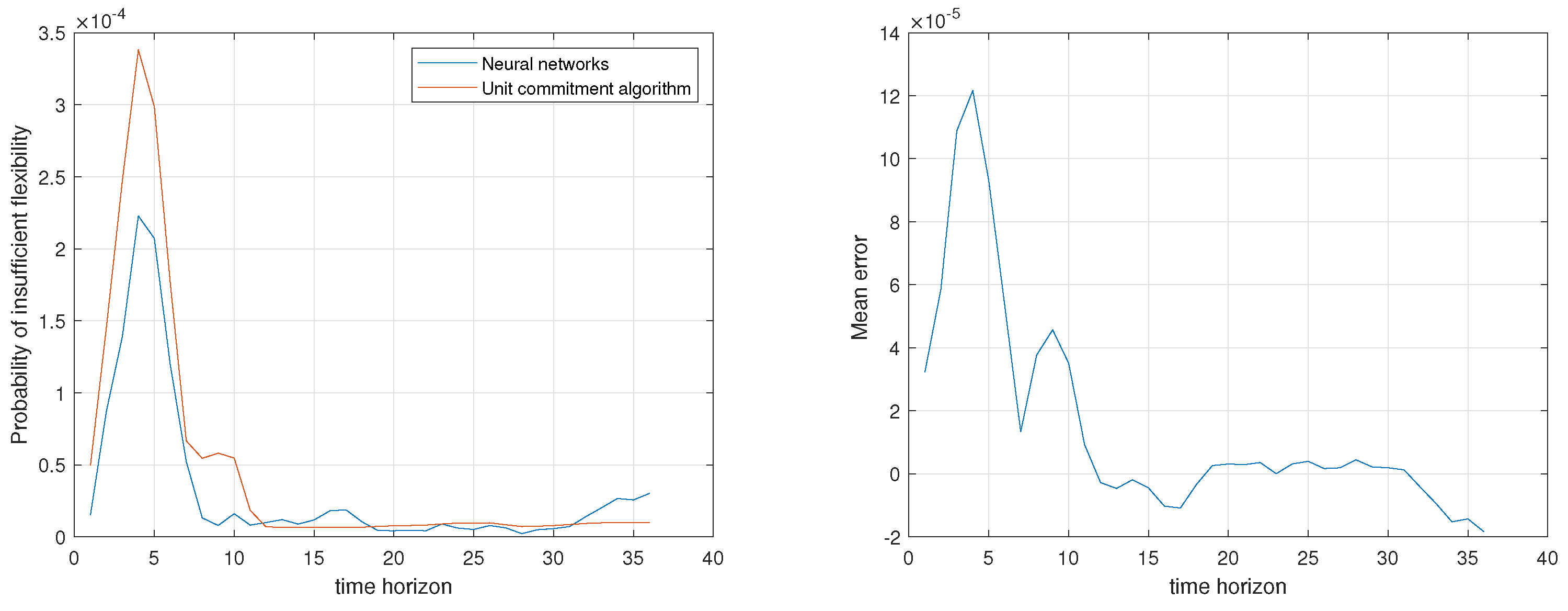Abstract
Increasing the generation of electric power from renewable energy sources (RESs) creates important challenges to transmission system operators (TSOs) for balancing the power system. To address these challenges, adequate system flexibility is required. In this context, TSOs carry out flexibility assessment studies to evaluate the flexibility level of the power system and ensure that a stable operation of the transmission system under high RESs integration can be achieved. These studies take into consideration numerous scenarios incorporating different assumptions for temperature, RESs penetration, load growth, and hydraulic conditions. Until now, flexibility studies usually solve the standard unit commitment problem and evaluate if the flexibility level is adequate. Although this approach provides quite accurate results, the computational requirements are significant, resulting in limiting the scenarios chosen for examination. In this paper, deep learning approaches are examined, and more precisely, an integrated system of two recurrent neural networks with long short-term memory cells is designed to carry out the flexibility assessment task, aiming at the reduction in the computational time required by the optimization process. The output of this neural network system is then used to calculate the probability of flexibility shortages. The proposed method is evaluated based on data from the Hellenic transmission system, providing quite promising results in (a) accurately calculating the probability of insufficient flexibility and (b) achieving a significant decrease in computational time. This novel approach could notably facilitate TSOs since more scenarios can be included, exploiting the computational efficiency of the method. In this way, a more complete evaluation of the flexibility level of the power system can be achieved and thus help to ensure the stable and reliable operation of the transmission system.
1. Literature Overview and Motivation of the Problem
In alignment with the global objective of limiting the temperature rise to 1.5 C by 2050, the European Union (EU) has committed to achieving net-zero greenhouse gas (GHG) emissions by the same target year, as outlined in the Green Deal and formalized in the European Climate Law of June 2021 [1]. The EU has set interim targets, notably aiming for a reduction in GHG emissions relative to 1990 levels by 2030 [2], which serve as crucial milestones towards carbon neutrality. Recognizing that energy production and consumption account for a significant of the EU’s GHG emissions, the Green Deal emphasizes the imperative of decarbonizing the EU’s energy system. To facilitate this transition, the Green Deal introduces “a clean energy transition”, which advocates for a secure and cost-effective energy supply with a strong focus on energy efficiency and renewable energy sources (RESs) in the power sector [3,4].
Apart from helping countries to meet the environmental targets, RESs are fundamentally the cornerstone of sustainability, in alignment with the objectives of preserving the environment, fostering social well-being, and ensuring economic stability [5]. Renewable sources like solar, wind, and hydroelectric power are not only abundant and clean but also cost-effective, presenting a sustainable alternative to traditional energy sources without the associated emissions of GHG or pollutants. These sources play a critical role in generating electricity while contributing to a cleaner, more sustainable environment. However, given that wind and solar plants, which constitute the majority of renewable power, are dependent on weather conditions, the expansion of their capacity leads to a notable surge in intermittent power generation. The increased presence of weather-dependent generation in the electricity production mix amplifies the uncertainty and variability [6].
In order to maintain the adequacy and stability of power systems, a significant amount of flexibility is required [7]. A separation of flexibility considering the end of the grid that is being involved at the system level and at the resource level is made in [8]. The former is the ability of the system to maintain performance despite the increasing uncertainty, while the latter corresponds to the ability of the production unit (resource) to respond to the operator’s signal and adjust its output to the changing demand conditions. Another definition of flexibility is given by [9], which is the power and ramp capability required to adjust generation in response to demand within a specific time interval. An inflexible power system is defined in [10,11] as a system that is unable to maintain stability and constant balancing between demand and supply. This has significant consequences, with the most critical being blackouts [12], which in turn have major social, political and economic impacts on daily human activities [10]. European Network of Transmission System Operators for Electricity (ENTSO-E) addresses power system flexibility as a tool that is used to facilitate the balancing between demand and supply in real time, allowing the system to adjust the demand and generation in response to inaccurate load and production forecasts and increased variability.
Flexibility studies determine the ability of a system to use its resources to meet the increased variations and uncertainty in the net load (difference between demand and electricity generation from non-dispatchable sources) and, therefore, are significantly different from traditional capacity adequacy studies of a system. Adequacy studies consider whether the installed generation will be enough to cover the expected demand, disregarding the system’s flexibility [13]. Furthermore, the conduct of flexibility studies plays a critical role in shaping the electricity network’s blueprint, encompassing considerations related to infrastructure improvements and the potential establishment of new power generation facilities. In this context, these studies play a pivotal role in formulating the operational and planning framework of transmission systems [14].
Until now, flexibility studies are conducted by solving the unit commitment (UC) problem for a set of scenarios incorporating different assumptions for the temperature, RESs penetration, load growth, and hydraulic conditions [15]. An example of a flexibility study can be found in [16], where the aim is to determine the flexible capacity needs for the system over a 10-year planning period from 2018 to 2027, considering different future operating scenarios. The study identified the requirements for flexible capacity and assessed the hourly and 3 h variability of the residual load. The findings revealed that the rising contribution of RESs necessitates higher ramping capabilities from conventional thermal and hydro units to manage the growing variability in net load. In [17], both conventional capacity and flexibility adequacy are examined over a 10-year study period (2018–2027) using particular probabilistic metrics. More flexibility assessment research was conducted in [18], in which the authors examined three different market designs.
Although the above approaches can provide accurate results, the computational load and simulation complexity are significant, resulting in limiting the scenarios chosen for examination. In the presented work, deep learning approaches are examined and tested in an attempt to provide an alternative to the conventional flexibility assessment approaches, bypassing the aforementioned limitations and significantly reducing the required computational effort. This novel approach could notably facilitate transmission system operators (TSOs) since more scenarios can be implemented due to the decrease in computational load. In this way, a more complete evaluation of the flexibility level of the power system can be achieved and thus help to ensure the stable and reliable operation of the transmission system.
Over the past decade, there has been significant research interest in employing machine learning techniques and deep neural networks (NNs) for electricity-related time series forecasting. Both increasing data availability and interest in artificial intelligence studies have prompted researchers to explore various network architectures, algorithms, and combinations thereof to attain high accuracy and minimize forecasting errors [19]. A survey paper concerning the implementation of NNs in the power industry, with a special focus on the areas of load forecasting, economic load dispatch, and security assessment, came to the conclusion that, compared with other techniques, NNs are notably faster despite the complexity of the problems under study [20]. According to the same study, NNs demonstrate significant capabilities for processing and classification, feature an extensive parallel distributed structure, and possess learning abilities. Additionally, the specific work reveals that NNs offer implicit nonlinear modeling and automatic filtering of system data. In [21], a comparison of twelve different models was conducted. The results based on the mean absolute percentage error (MAPE) indicated that long short-term memory (LSTM) NNs perform better in short-term than in long-term forecasting. Furthermore, LSTM models showcase increased accuracy due to the sequential knowledge. NNs, and specifically LSTM, have been used for diverse tasks like forecasting of consumption [22,23], solar power prediction [24,25], electricity price forecasting [26,27], and the prediction of distributed energy resources’ flexibility [28]. In general, results indicate that LSTMs outperform traditional and other deep learning methods, especially in the short-term horizon.
In this work, we develop an integrated system of NNs employing the LSTM philosophy in order to approximate the results obtained from the conventional method of performing a flexibility study, i.e., by solving the UC problem. With this attempt, we aim to provide an alternative framework for assessing the flexibility of the power system in a more cost-effective manner (in terms of computational time) and, at the same time, respecting the complex nature of the UC problem. According to the authors’ knowledge, this is a first attempt to approach a UC problem of flexibility studies with the usage of deep learning; hence, the ultimate goal is to examine whether such a method could have adequate results. Overall, the contribution of this work can be summarized as follows:
- For the first time, deep learning approaches are implemented to carry out flexibility studies of transmission systems. Although a number of studies have appeared in the literature employing NNs in power systems, to the best of our knowledge, NNs have not yet been implemented in such a wide energy transmission system framework.
- Our approach succeeds in approximating the optimization process conducted by the UC algorithm in a very cost-effective manner in terms of computational time since a significant time reduction is achieved in calculating the flexibility of the system. Without any doubt, such modeling approaches might facilitate TSOs since the significant reduction in time requirements allows for the inclusion of more scenarios during the flexibility assessment process. In this way, a more complete evaluation of the flexibility level of the power system can be achieved and thus help to ensure the stable and reliable operation of the transmission system.
- The performance of the proposed method is tested in a real transmission system case, namely, the Hellenic transmission system, and assessed under a number of different scenarios with very satisfactory results.
The rest of the paper is organized as follows: In Section 2, the conventional method is presented to carry out flexibility studies, providing details concerning the complex nature of the UC optimization problem and the indicators used for assessing the flexibility of the power system. In Section 3, the proposed NN-based model is presented for the estimation of the flexibility adequacy of the power system and then is implemented in the Hellenic Electricity Transmission System (HETS) case. Finally, in Section 4, some conclusions are drawn.
2. Conventional Flexibility Studies
In this section, the methodology is introduced, as well as the metric tools that are incorporated in order to perform a conventional flexibility study. First, the UC optimization problem and its features are described in detail, and then the framework is presented under which the flexibility of the system is assessed, defining the appropriate indices for assessing flexibility at both the unit and system level.
2.1. Net Load
The net load describes the total amount of load that must be covered by dispatchable units, usually consisting of lignite, natural gas, and hydroelectric power plants. More specifically, the net load is determined by the equation
where (a) the System Load component refers to the overall electricity demand including network losses and the power generated by RESs within the distribution network, usually consisting of photovoltaics; (b) the Transmission RES component refers to the electricity generation from RESs directly linked to the transmission system, primarily comprising wind power production; and (c) the Exports/Imports components express the aggregated electricity exchanged between neighboring countries. The unpredictable nature of RESs causes many operational obstacles, as the magnitude of the net load showcases increased variability according to the weather conditions [29]. Furthermore, the changing behavior regarding consumption and demand of electricity increases stochasticity and uncertainty to the load. This has led to one of the critical challenges of electricity systems, which is to sustain reliability and safety under these conditions, by balancing the power system in real time [30,31,32].
2.2. The Unit Commitment Optimization Problem
The UC is a complex mathematical optimization problem with a significant computational cost in which the production of a set of electrical generators is coordinated to match the energy demand at a minimum cost under the examined scenarios, taking into account the induced uncertainty from forecast errors or outages. The UC optimization problem, as it is defined in [15], aims to optimize the objective function
where . The first part of the cost function (2) refers to the day-ahead scheduling with G denoting the set of available generators and T the length of the generation planning horizon. More specifically, and are the start-up and shut-down costs of unit g at time t, and are binary variables that indicate the start-up or shut-down actions of unit g at time t, is a coefficient for power, is the function of the fuel cost, and is the power generation output of unit g at time t. Moreover, is the value of the lost load and refers to the loss that is incurred in case of electricity interruption [33], and is the scheduled load shedding at time t and refers to the reduction in electricity consumption by large consumers [34]. Finally, and are coefficients for the upward and downward reserve of generator g, respectively, while and correspond to the upward and downward reserve capacity of the same unit.
The second part of the cost function (2) refers to the balancing scheduling, which means adjustments that are being made closer to the real time. For this purpose, different scenarios are being considered with denoting the set of all scenarios that are involved. More specifically, the terms and represent coefficients of generator g for upward and downward regulation, respectively, and and are the upward and downward regulation of unit g at time t under scenario . is the load shedding loss at time t in scenario , is the value of RESs curtailment, and is the amount of the curtailed RESs generation at time t in scenario .
The problem is formulated as a detailed mixed integer linear programming problem with constraints regarding generation–demand balance, upward and downward ramping rates, minimum time of operation, plants’ capacity and maintenance schedule, etc. To keep concise the description of the UC problem, the constraints of the UC problem are described in detail in Appendix A.
2.3. System Flexibility and Flexibility Metrics
System flexibility refers to the ability of the power transmission system to respond to significant ramps that may occur in the load of the electricity network. As precisely defined in [35,36], power system flexibility is the ability of the system to exploit all resources to respond to the net changes in demand. It becomes clear that a power system leverages the available flexibility in order to deal the uncertainty imposed by the massive penetration of intermittent energy resources. However, the problem of hourly flexibility allocation to the available production units on a daily basis is a complex and time-consuming problem to be solved. To assess the flexibility of a power system, flexibility metrics are usually utilized. In the following, we provide in mathematical terms the relevant definitions of the net load ramps and the flexibility of a power system, along with a suitable flexibility metric that is employed in this work.
2.3.1. Net Load Ramps
Net load ramps are defined as the changes in the net load over a specified period. Grid operators closely monitor these ramps to ensure grid stability and reliability [37]. The net load ramp time series at time t for time horizon i is defined as follows:
The net load ramps could take positive () or negative () values, which denote positive and negative ramping occurrence, respectively.
2.3.2. System Flexibility
System flexibility is defined as the total available flexibility of all individual units. In particular, the available upward (U) and downward (D) flexibilities, or the so-called available resource flexibilities, for each unit , over a horizon i, at observation t are defined, respectively, as
where is a binary variable that represents the commitment decision for generator g at time t, and denote the respective ramping up and down limits of generator g, and is the start-up time for generator g. Then, the flexibility of the system for time horizon i at observation t is calculated by aggregating the available flexibility of all units, i.e.,
For the reader’s convenience, we will examine only the upward flexibility that we will depict from now on as and refer to it as just flexibility. However, a similar methodology can be easily implemented for the downward flexibility.
2.3.3. Flexibility Metrics
The adequacy of the available flexibility can be measured via different flexibility metrics. In this study, we utilize the Flexibility Residual Index (FRI) [7]. Flexibility residuals of the system are calculated at each observation t and time horizon i based on the total available flexibility of the power system and the flexibility requirements calculated from the net load ramps. Specifically, the flexibility residuals are defined as
where denotes the time horizon and the observation time with n denoting the hourly length of the time frame of the examined flexibility study. The length of time horizon i is set to 36 h based on the work of [14], in which it is stated that the power system will have experienced the full extent of variability during those hours. The sign of the flexibility residual determines the adequacy of the available flexibility. In that sense, negative values indicate the situation where the system has insufficient ramp resources. The flexibility residuals can be considered as independent and identically distributed observations for any hour of measurement t and for each fixed time horizon . Avoiding to make any parametric assumption for the residual distribution for each i, a kernel-based estimator is implemented for the estimation of the relevant probability density function. For example, for the flexibility residuals, the relevant density for fixed time horizon i is estimated by
where x denotes the flexibility residual variable (considered as independent and identically distributed for each i), n is the sample size of the time series, denotes the kernel function that is incorporated, and denotes the bandwidth size. In this case, the typical Gaussian kernel is used (i.e., ), and bandwidth size h is chosen according to Silverman’s rule of thumb. The FRI concerning this case for each time horizon i corresponds to the probability that the flexibility residual output becomes less than zero (i.e., the probability that the system has insufficient ramp resources) corresponding to the calculation
3. A Neural Network-Based Approach for Assessing the System Flexibility
Usually, flexibility studies are carried out based on the methodology described in Section 2. However, the computational load and simulation complexity are significant, resulting in limiting the scenarios of the net load forecast that the system operators choose to examine. Therefore, we propose deep learning algorithms to carry out the flexibility studies that aim to significantly reduce the computational time needed for executing the optimization process. In particular, we want to estimate the flexibility of the system as determined in (6), using as the main input the net load as specified in (1) of each scenario that the system operator takes into account, and then calculate the probability that the system has insufficient upward ramp resources based on (10) without the need to execute the complicated UC optimization problem stated in (2).
3.1. Methodological Aspects
The primary challenge addressed in this study is effectively estimating the system flexibility time series. Instead of employing conventional time series modeling approaches, in this work, NNs are utilized, and specifically recurrent neural networks (RNNs) endowed by LSTM shells, due to their advantages, which will be analyzed in the following.
The main idea behind our approach is the following: The flexibility index is obtained in terms of the value function of the solution of a constrained optimization problem (see Appendix A), which, among other control variables, (denoted by z) solves for the entry into the production system of the various units monitoring their contribution to the total power production. An important feature of this optimization problem is the fact that it is a parametric optimization problem. More precisely, the constraints of the problem (which play the important role of guaranteeing that the system is capable of performing so that the energy needs are covered) depend on the electricity demand pattern, or rather the quantities , (see (A5) in Appendix A)—which are assumed to be the parameters of the problem. To clarify the idea, we express the optimization problem (2) in the concise formulation
where refers to the control variables vector, refers to the parameters (i.e., the electricity demand pattern), and the functions and C correspond to the objective function and the constraint function, respectively (defined precisely in (2) and Appendix A). The various system flexibility indices are obtained in terms of the value of problem (11) (i.e., the minimum attained for the function over the constraints set). The value naturally depends on the choice of the parameter for the constraints. If we can obtain a description for the function , then given a particular demand pattern , we can obtain the corresponding system flexibility , a quantity that is of importance for operational purposes and for the sustainability of the system. This will allow for instance scenario planning, i.e., given a possible demand pattern, hereafter referred to as scenario, to find the corresponding flexibility of the system. The obvious way to obtain the function is through the specification of its values for the required : i.e., given a scenario , directly solve the optimization problem (11) for the choice , and through its solution, determine . However, this is a time-consuming task, as the corresponding optimization problem is a difficult and complex one.
The alternative we propose here is to construct a RNN that “learns” the function from data by constructing an approximation in terms of a suitable architecture and choice of a suitable activation function. Then use the approximation to assess the system’s flexibility under the various possible scenarios or contingencies for the demand pattern . The training data for the RNN can be limited data , , obtained by the direct solution of the optimization problem (11), and after appropriate training, all subsequent assessment of the system’s flexibility will be performed using the RNN approximation . This will make the process of assessment of the system’s sustainability a more manageable, efficient, and less time-consuming task since the heavy computational task of solving problem (11) will be cut to the bare essential. It will also allow for the generation of multiple scenarios for the system’s flexibility, which may be used constructively for the assessment of the system’s sustainability, planning purposes, risk management purposes, etc.
Before proceeding to the actual methodology used to achieve this task, we must make two remarks. The first one is theoretical and is related to the ability of an RNN to capture the behavior of the function . Well-known results prove that, under conditions, NNs are universal approximators for continuous functions. Since problem (11) is a mixed integral programming problem, the continuity of the function is not so straightforward to determine. However, since the integer parts of indicate the activation of production units, and the production of a unit upon activation is gradual, we expect that the contribution of the integer variable in the objective function (which essentially monitors total energy production) does not induce any major discontinuities (when viewed as a function of the parameter ). Hence, we conjecture that can be approximated by an NN, and this conjecture will be tested a posteriori (note, moreover, that even if these are discontinuities of the function , NN may approximate a discontinuous function even though such cases may not be strictly covered by the universal approximation theorem). The second one is related to the use of the term “scenario”. In this work, when using the term scenario, we refer to a given energy demand pattern . Clearly, there is a whole set of parameters and factors, denoted briefly as , that may affect this demand pattern, the first ones that naturally come to mind being climate parameters such as temperature, humidity, and sunshine. However, all these parameters and factors do not explicitly enter the formulation of the problem that only depends on —and not (see Appendix A)—even if they implicitly affect . This means that, to specify a scenario, for the purposes of this work, it is sufficient to have a demand pattern , without any reference to any other parameters . While the parameters are not strictly needed, reference to them may have some explanatory value, i.e., help the decision maker associate certain demand patterns with the climate conditions (e.g., a particularly hot summer leading to increased energy demand due to air conditioning needs) and help us combine scenarios with narratives concerning more general circumstances, for which one may also have trustworthy predictive models (such as climate). Hence, even though redundant for our needs here, for the sake of storytelling, we may associate a particular demand pattern scenario , with the underlying “explanatory” variables by making reference to the calendar year corresponding to this demand pattern and keeping track of climatological circumstances prevailing on the particular calendar year.
An RNN constitutes a generalization of the feedforward NN paradigm characterized by the extra feature of the internal memory. Its recurrent nature is showcased by its ability to execute a consistent function for each input, whereas the output of the current input depends on the computational history involving past inputs. Then, the output is duplicated and reintroduced into the recurrent network. In contrast to conventional NNs, RNNs exploit their internal state or memory to process sequences of inputs and establish inter-dependencies among all input, a characteristic that makes them suitable for treating time series since they are able to capture potential temporal dependencies (like seasonality). The special case of LSTM networks represents a variety of recurrent neural networks, designed to enhance the integration of historical data within the network’s memory. They were introduced by [38], and since then, they are used regularly to solve complex sequential estimation problems. In this context, RNNs endowed with LSTM cells constitute a reliable solution to treat complex problems like (2). For more technical information about the LSTM neural networks, the interested reader is referred to [39].
Additionally, in our approach, the method of a Fully Connected Layer (FCL) is employed between the last hidden layer and the output. The FCL receives the output from the recurrent layers and transforms it into the desired output format. FCLs play a pivotal role in enhancing the efficiency of NNs. Therefore, given enough neurons and appropriate training, FCLs are able to represent and map complex input–output relationships, making them highly versatile in modeling and learning complex data patterns [40,41].
In our work, we develop a network system that combines the aforementioned tools to a nested-neural network (nested-NN) structure, i.e., an integrated system of two networks in which the first models direct the flexibility output while the second optimize the residual between the predicted and the actual flexibility. In particular, the second NN is implemented as an extra filtering step with the purpose of improving the final estimation by reducing the initial estimation error and removing any remaining systematic error patterns. Note that both NNs are constructed employing the RNN–LSTM philosophy.
3.2. The Proposed Network Model
Let us describe in more detail the nested-NN model approach that is proposed in this work. Our approach consists of two separate but nested NNs employing the RNN–LSTM structure. The first one directly models/predicts the system flexibility at each considered time horizon (i.e., it could be considered as the combination of 36 different NNs where each NN models the flexibility from the measurement hour t at the -th hour ahead). The second NN is used for the prediction of the error between the actual flexibility value and the predicted value from the first NN. This coupled system of NNs is expected to simultaneously (a) predict both system flexibility and the relevant residuals from the actual values, and (b) further reduce the error magnitude concerning the prediction of the actual flexibility through the combination of the two NNs, which also, by construction, take into account potential temporal effects.
In both NNs as input, time series data for hourly net load and time indicator variables are employed. The time series data for net load and system flexibility exhibit recurring patterns that repeat over fixed intervals, such as daily, monthly, or yearly cycles. These cyclical patterns pose a challenge for traditional machine learning models, which may struggle to capture and interpret them effectively. Therefore, cyclical transformations are utilized in our model to address the periodic nature of certain features within the data. Cyclical transformation involves encoding cyclical features, such as time of day, day of the week, month, or season, into a format that preserves their seasonality. One common approach is to use trigonometric functions, such as sine and cosine, to transform these features into two separate continuous variables. This transformation allows the network model to incorporate the cyclical nature of the data and improves its ability to capture and predict future patterns [42]. In this specific work, the authors make use of daily and yearly trigonometric functions. First, using the timestamp, a unique number representing the seconds was allocated to each observation. In addition, we defined the seconds that exist in the specific period of time, and finally, we applied the corresponding trigonometric function (sine or cosine) with a frequency that depicts the amount of seconds. Thus, the number of the seconds in a day is 86,400, and in a year, it is 31,556,952. Additionally, the used formula to calculate the trigonometric values is . This way, we enforced the model to better predict values of the same day in different years. Adopting this technique, the input lines incorporated in both NNs are of the following form:
Employing the above input form, the two components of the network system can be represented as
for time and time horizon . Parameter m determines the time window that is applied. Equation (13) determines the model for the estimation of the system flexibility, and Equation (14) determines the model for the estimation of the flexibility residuals. Note that the nested nature of the system arises from the fact that, for the estimation of model , the knowledge of model is necessary in order to estimate the differences between the actual flexibility of the system (as determined from the solution of the UC problem stated in (2)) and the predicted flexibility from (13). Combining the two models, the final estimate is obtained for the flexibility through the representation
This improved estimate concerning the flexibility of the system is then used to calculate the flexibility index as stated in (10).
3.3. Description of Data and Data Flow Process
For the scopes of this study, net load time series data provided from the Hellenic TSO, namely, the Independent Power Transmission Operator (IPTO), are used. These data concern forecasts made by the Hellenic TSO for the hourly net load under different scenarios for the demand pattern. For the creation of these scenarios, the hourly demand time series of the normalized load as analyzed in ENTSO-E midterm adequacy forecast [43] serves as the input. In particular, ENTSO-E’s Pan-European Climate Database (PECD) includes a number of countries and climate years, available from existing global climate reanalysis models and consisting of hourly data for 1982 to 2015. PECD consists of the following data sets: (a) wind speed, radiation, and cloud cover time series; (b) onshore, offshore wind, and solar PV load factor time series; (c) concentrated solar power load factor time series; and (d) temperature time series. PECD integrates the statistical representativeness of extreme climate and calendar events, such as cold spell, heat waves, extreme low wind conditions, and solar eclipses. Each climate year represents a combination of load (accounted temperature sensitivities), wind, and solar time series. Subsequently, the projection of the normalized net load for each hour throughout the year is generated by incorporating varying assumptions related to temperature, load growth, RESs penetration, and hydraulic conditions. Obviously, the impact of temperature is more significant than other factors. Consequently, a base scenario is established for load growth, RESs penetration, and hydraulic conditions, with the forecast time series adjusted to account for the temperature effect. All the scenarios regarding the net load have been generated by IPTO. We used the 10 scenarios that were implemented in [15], which act as input to the UC algorithm and, consequently, to the designed NN. Each scenario corresponds to a 5-year period, which equals 43,680 hourly observations.
Since the scenarios have been received and used as a black box for this specific study, a more detailed statistical analysis, which provides more insights, was conducted. As mentioned, the key factor that separated the scenarios was the temperature, so the following analysis concerns the Summer period, when the temperature variability is traditionally higher in Greece, and this has an direct effect on the power system. First, we calculated the residual rolling difference and absolute difference of and in an effort to observe and determine which scenarios have the higher fluctuations and value differences. Specifically, we calculated and , where was replaced by and .
By applying a K-means analysis on the extreme value characteristics (i.e., skewness and kurtosis statistical indices were used) for all the aforementioned time series (residual and absolute rolling difference), three groups were created, characterized by the fluctuations of the examined data. The results, which are illustrated in Table 1, show the three categories based on stress level, which in principle depicts the fluctuations of and , respectively. In this vein, it would be reasonable to claim that scenarios 1 (baseline scenario), 2, 3, 4, 7 and 9 can be characterized as the less extreme ones (low stress level), scenarios 6 and 10 as the middle cases (medium stress level) and scenarios 5 and 8 as the most extreme ones (high stress level).

Table 1.
Scenario characteristics concerning their extreme behavior in the Summer season.
Based on the clustering that is illustrated in Table 1, the mean value, of skewness and kurtosis, for all the three clusters were calculated. Figure 1 shows the mean values of the above-mentioned stats for the absolute and residual rolling difference of per cluster and hour of the forecast horizon (). Figure 2 shows the same stats for .
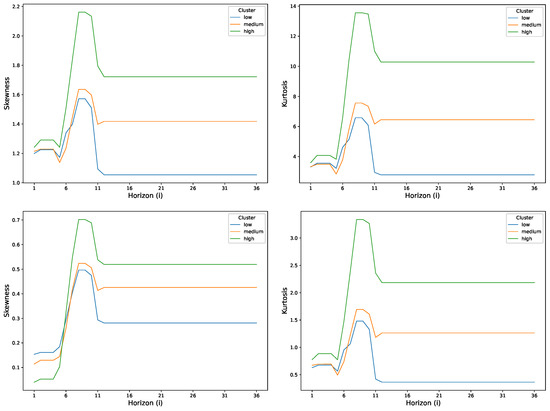
Figure 1.
Mean value of skewness (left) and kurtosis (right) of the distribution of the absolute rolling difference (upper panel) and rolling difference (lower panel) of per cluster and hour of the forecast horizon (i).
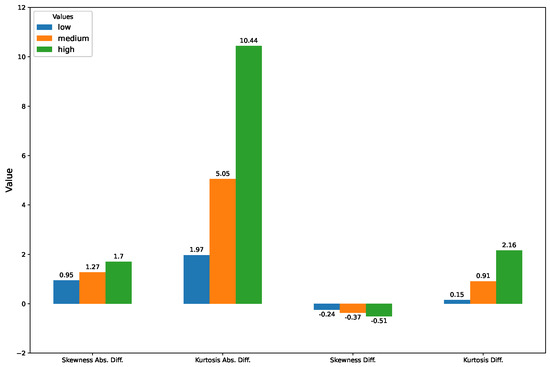
Figure 2.
Mean values for skewness and kurtosis indices for the absolute and the residual rolling differences of per group.
Alongside with the net load scenarios, the developed solution makes use of the available system flexibility, which is the output of the UC algorithm as it was calculated by [15]. One should note here that the main purpose of the proposed nested-NN system is to estimate as accurately as possible the available system flexibility calculated from the UC problem without however needing to actually solve it. This obviously significantly reduces the computational load of conducting flexibility studies, and therefore, TSOs can more easily include a larger number of scenarios.
The process depicted in Figure 3 illustrates the dataflow process for the calculation of the probability of insufficient flexibility. The upper part of Figure 3 illustrates the data process of the UC algorithm that first calculates the system flexibility, represented as , and then the probability of HETS to have insufficient flexibility for the 36 h horizon. The lower part of Figure 3 depicts the proposed methodology that first estimate the flexibility of HETS and then again calculates the probability of HETS to have insufficient flexibility resources for the 36 h horizon.
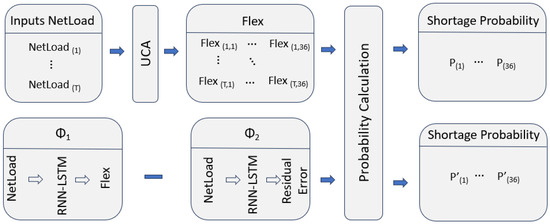
Figure 3.
The dataflow process for the calculation of the probability of insufficient flexibility. The two branches represent the conventional process (upper flowchart) and the process applied in this study (lower flowchart).
3.4. Model Training Stage
For training purposes, different models with various characteristics, based on the number of hidden layers, number of nodes, size of the fully connected layer, and number of past observations, are employed and tested. For each training, the two nested-NNs ( and ) are considered to have the same characteristics when it comes to the evaluation mentioned above. Specifically, we tested the case of NNs involving one and two hidden hidden layers with all the possible combinations of 100, 150, 200, 250, and 300 hidden nodes. As mentioned in Section 1, the ultimate target of the specific work is to set the ground for further investigation while examining whether or not this kind of problem could be approached by a methodology based on NN. In this context, the processes of training and validation were conducted using the data of scenario 1, which appears to be the mildest, especially during Summer months where the temperature fluctuations are higher, as described in Section 3.3, and then it was observed if the model that was trained under low-stress conditions can adequately predict of other, even more extreme scenarios. The of the available data were used for training purposes, while the other were equally split between validation and testing processes. The employed deviance criterion for the model selection is the MAPE index, which is calculated based on the following Equation (16):
where n is the number of observations, is the flexibility calculated from the UC algorithm, and is the one estimated by the proposed nested-NN model. For each tested model, first, the MAPE for each forecast horizon hour is calculated, and then the mean value of all 36 h of the time horizon was used as the final MAPE corresponding to the model. This final mean value of the calculated MAPE, which concerns the total nested system, is illustrated in Figure 4 and Figure 5, where the window size (WS) denotes the number of past observations that are used as input.

Figure 4.
Calculated MAPE for different combinations of dense size, nodes, and window size for one hidden layer.
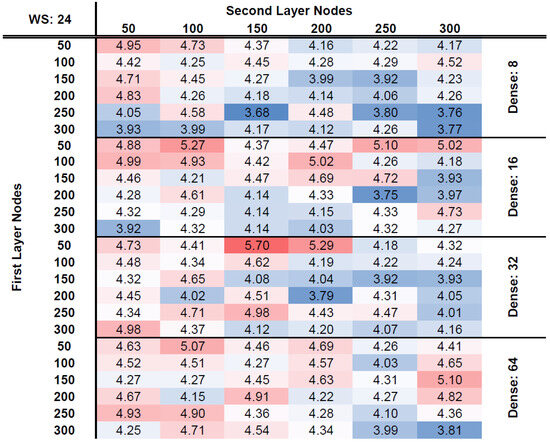
Figure 5.
Calculated MAPE for different combinations of dense size and nodes for two hidden layers and window size equal to 24.
Figure 4 and Figure 5 do not reveal any clear pattern regarding the model parameters. Additionally, there are models, with one or two hidden layers, that provide similar MAPE values. Increasing the number of layers or nodes that are being used in the designed and trained NNs inevitably increases the complexity of the problem due to the higher number of parameters that are being introduced to the NN. In addition, it was observed that increasing the number of layers or nodes did not always increase the accuracy of the model. Thus, the computational time increased without improving the model performance. There are several underlying factors that contribute to this phenomenon. Primarily, an excessive number of hidden nodes can precipitate overfitting, causing the model to specialize excessively on the training data and subsequently perform poorly on unseen data. Furthermore, complications such as vanishing gradients can emerge, posing challenges to the effective weight updates during training. As such, a higher number of hidden nodes does not always enhance model performance; a holistic approach encompassing architectural considerations and hyperparameter optimization is essential. For testing purposes and in order not to increase the computational requirements, the single hidden layer model that performs better in terms of the MAPE index () is chosen, i.e., the model that employs 200 nodes, has a dense size of 8, and has a WS equal to 24. In Table 2 is depicted the employed structure for the chosen model, i.e., the number of nodes, the size of the fully connected layer, and the number of past observations that are used as input for each nested NN. We note here that the training and testing tasks of the model were performed in Python 3.10.5 employing the keras package.

Table 2.
Chosen structure for each NN of the nested system.
3.5. Assessing Performance in Flexibility Prediction under Different Scenarios
The selected model was tested for the remaining nine scenarios of the HETS described in Section 3.3. Based on the system flexibility estimated by the proposed nested-NN model, the probability of insufficient flexibility is calculated and compared with the results obtained from the UC algorithm. We present in Figure 6 the obtained estimates for the probability of insufficient flexibility (FRI) by the UC algorithm (ground truth) and the nested-NN model for all scenarios. In Figure 7, the mean value of all scenarios is illustrated, as well as the mean error in the probability of insufficient flexibility between the nested-NN model and the UC algorithm. Both methods provide similar results since both determine an extremely low probability that the HETS will face a flexibility shortage. Moreover, the nested-NN model successfully captures the pattern of the FRI. The higher probabilities during the first 6 h occur since the net load ramps increase during that period where limited available flexibility resources exist, since most of the power plants need 5 h or more to start up and be ready to provide flexibility services to the transmission system. The maximum absolute mean error of the between the two methods, as one can observe in Figure 7, takes the value of for time horizon . The absolute maximum error of observed in all scenarios was found to be equal to in scenario 5 at time horizon . These errors can be considered negligible in the context of the studies that TSOs carry out [15]. Table 3 shows the mean absolute error of the FRI for the nine tested scenarios. As illustrated, the minimum value of absolute FRI error is , which corresponds to scenario 9, which in turn belongs to the high stress level cluster. The average value of the mean absolute FRI per cluster is , , and for the low-, medium-, and high-stress level cluster, respectively. Overall, one can conclude that the proposed nested-NN model estimates successfully and regardless the stress level the flexibility adequacy of the HETS.
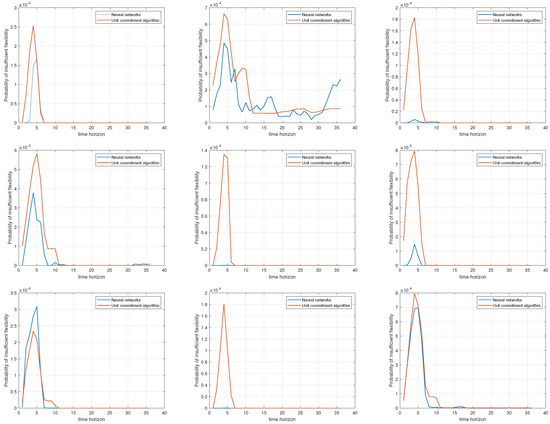
Figure 6.
Flexibility residual index approximation under scenarios: 2, 3, and 4 (upper panel); 5, 6, and 7 (middle panel); and 8, 9, and 10 (lower panel).
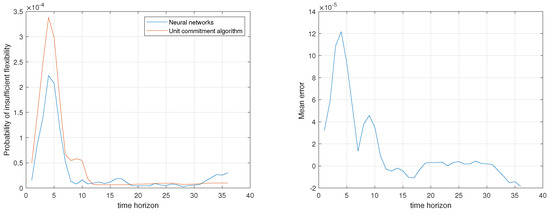
Figure 7.
Mean flexibility residual index for all scenarios (left) and mean error between the UC and NN algorithm (right).

Table 3.
Mean absolute approximation error for the FRI per scenario.
Moreover, in Table 4, the required time is illustrated for both the UC algorithm to solve the optimization problem and the designed model to make estimations for each scenario. It is clear that the UC algorithm requires significant higher computational time to provide the solution, and therefore, as a result of estimating the flexibility of the power system under each scenario (1 to 2 h), the proposed nested-NN model requires less than a minute in all cases. Therefore, it is concluded that the flexibility of the power system can be assessed in a more efficient way in terms of computational time, which is quite important for the short-term planning at the operational level.

Table 4.
Computational time required for each method to calculate the available flexibility.
4. Conclusions
In this paper, a novel nested-NN model was proposed to replicate a crucial and of high computational complexity algorithm that plays a pivotal role in the planning process of TSOs, especially in the era of increased RESs penetration. The presented model approximates in two stages the actual flexibility of the system by the two integrated NNs employed within the model structure. Increasing the number of layers or nodes that are employed within the nested-NN model inevitably increases the complexity of the problem due to the higher number of parameters required. However, the implementation of more dense NNs (i.e., increasing the number of layers and/or nodes) did not necessarily increase the accuracy of the model, leading to increased computational time without any improvement in model performance. Thus, an admissible combination was chosen that provides accurate-enough results and at the same time keeps low the computational effort.
Results indicate a significant reduction in computational time from some hours to less than a minute when comparing the conventional method of calculating the system flexibility with the nested-NN model proposed in this study. This is of course something that TSOs can leverage in order to examine a much-wider range of scenarios. On the prediction data accuracy side, results show a good fitting between flexibility shortage probabilities for different forecasting horizon and for various scenarios. Moreover, the NN solution is able to capture the probability trend, and the error observed can be considered negligible for TSO planning studies.
The specific model was trained under the constraints and parameters of the Hellenic power system. This means that specific characteristics, like production units’ specifications and grid’s characteristics, have been considered and contributed to the specific model training. Given the availability of other data, the same methodology could apply but new training would be required. In principle, one could expect that the proposed nested-NN model can be effectively applied to different power systems or regions, but new and relative data are a prerequisite.
For further research, it is important to examine how the precision of the solution depends on the amount of learning set and its sensitivity to overlearning. Diverse learning sets can often lead to improved precision in predictions. However, it is important to set a limit because an excessively large learning set can also lead to overfitting, where the neural network performs well on the training data but poorly on new, unseen data. In addition to this and as mentioned in Section 1, the target of the specific research was to observe if it would be feasible to approach the UC algorithm with a model of NN, in a sense to reduce the computational time while not significantly losing in accuracy. Results showed that this is realistic to be claimed since the train of the model was done using the mildest, in term of fluctuations, scenario and the application to other scenarios did not reveal any pattern of inadequacy regarding the stress level clustering. In this context, a future work might be the consideration of different scenarios in the training process and maybe a scenario generation using the samples of the available ones in order to increase the stress level even more.
It would also be interesting if the proposed NN model not only estimates the flexibility of the power system but also makes proposals on what are the best solutions to improve its flexibility by indicating suitable upgrades of the transmission system, construction of new plants, or new interconnections lines. Overall, the presented work shows promising results of utilizing NNs in flexibility studies of TSOs. Taking into account the significant progress currently observed in NNs, one could expect that they can be a valuable tool in the near future for the planning and operation of TSOs.
Author Contributions
All authors have contributed equally to the derivation of the results of this work. All authors have read and agreed to the published version of the manuscript.
Funding
This research received no external funding.
Data Availability Statement
Restrictions apply to the availability of these data. Data were obtained from IPTO S.A. and are available from the corresponding author subject to the permission of IPTO S.A.
Conflicts of Interest
Author Konstantinos F. Krommydas was employed by Independent Power Transmission Operator S.A. The remaining authors declare that the research was conducted in the absence of any commercial or financial relationships that could be construed as a potential conflict of interest.
Appendix A. UC Problem Constraints
A detailed description of all the constraints on which the UC problem (2) is subject to is provided in the following.
Appendix A.1. Minimum Up and Down Time
Minimum up and down time constraints are essential in power system optimization models, ensuring that power plants comply with specific technical requirements regarding their start-up and shut-down duration [44]. According to these specifications on the commitment decisions represented by the variables , the following inequalities should be satisfied:
Equations (A1) and (A2) indicate the minimum time that generator g should operate (minimum up time) or be idle (minimum down time), respectively. Parameter is the corresponding time period starting from time t and limited by either the minimum time that generator g should be up () or down () or the length of the generation planning horizon (T). Up and down times depend on a specific unit’s characteristics and are unique for each generator.
Appendix A.2. Start-Up and Shut-Down Decision Variables
Start-up and shut-down decision variables in energy market optimization models dictate the optimal timing for initiating or halting power generation from various sources. These decisions are typically made to minimize costs while fulfilling operational constraints [45]. Constraints (A3) and (A4) provide the limitations regarding the binary variables for start-up and shut-down actions of unit g at time t. As shown, those variables are limited by minimum up and down times, respectively.
Appendix A.3. Generation Constraints
Generation constraints define the boundaries of power generation considering factors such as plant capacity, balancing generation, and demand [46].
Constraint (A5) specifies the minimum scheduled production at time t. In particular, the sum of the total generation of all conventional units (), the scheduled load shedding (), and the scheduled RESs generation () at time t should always be equal or greater from the forecast hourly demand at time t (). Constraint (A6) determines the upper and lower limits of the power generation output of generation g at time t, which are the maximum and the minimum power generation for unit g ( and ), respectively. At this point, we remind the reader of in the commitment decision (binary) for unit g at time t. Finally, constraint (A7) sets the lower and upper limit of the scheduled load shedding loss at time t.
Appendix A.4. Ramping Limits
Ramping limits impose restrictions on the rate at which power output can change [44]. These constraints set the limits for the incremental increase or reduction in the generated power of unit g in one period of time and are depicted below:
The above constraints express that when a generator is on and there is a need to increase or reduce its production, this can be done with the upward or downward ramping limit, respectively (). When the generator is on and needs to turn off or the opposite, the change in generation output has to be equal to the minimum power generation () for one period of time and then starts producing or turns off.
Appendix A.5. Reverse Capacity
Reserve capacity is a backup energy generation capacity that is used by the electric grid to cope with unexpected outages or forecast errors [44].
Equations (A10) and (A11) define the amount of the upward or downward reserve capacity that can be offered by generator g at time t. According to this set of equations, the generator can offer upward reserve capacity () so that the sum of this capacity with the actual power generation does not exceed the unit’s maximum power generation () and downward reserve capacity () up to the point where the capacity would be deducted from the actual power to still be equal or higher than the unit’s minimum power generation ().
Appendix A.6. Real-Time Balancing Constraints
Real-time balancing constraints refer to real-time operation of the electric grid, encompassing tasks such as load balancing and responding to unexpected changes in supply or demand [44]. Since these equations refer to real-time adjustments, different scenarios are considered. Each one of them is presented as , while the whole set of available scenarios is .
where and is the amount of power by which the unit can increase or reduce it production and is a binary variable that defines whether the unit faces any kind of outage or not. Equations (A12) and (A13) set the limit of increase or reduction for the generator’s production up to the corresponding available reserve capacity.
Equations (A14) and (A15) illustrate the maximum possible load shedding and RESs curtailment, which cannot exceed the demand and RESs generation, respectively. Note that all the aforementioned quantities should be positive, leading to the physical constraints
while the balancing constraint
ensures that the increase or reduction in production from day-ahead scheduling to real-time balancing operations should be equal with the corresponding change of the load or RESs production.
References
- European Commission. Communication from the Commission to the European Parliament, the Council, the European Economic and Social Committee and the Committee of the Regions Youth Opportunities Initiative; European Commission: Brussels, Belgium, 2011. [Google Scholar]
- European Commission. A Policy Framework for Climate and Energy in the Period from 2020 to 2030; Communication from the Commission to the European Parliament, the Council, the European Economic and Social Committee and the Committee of the Regions; European Commission: Brussels, Belgium, 2014. [Google Scholar]
- Paleari, S. The Role of Strategic Autonomy in the EU Green Transition. Sustainability 2024, 16, 2597. [Google Scholar] [CrossRef]
- Ravani, M.; Georgiou, K.; Tselempi, S.; Monokrousos, N.; Ntinas, G.K. Carbon Footprint of Greenhouse Production in EU—How Close Are We to Green Deal Goals? Sustainability 2024, 16, 191. [Google Scholar] [CrossRef]
- Liu, J.; Huang, S.; Shuai, Q.; Gu, T.; Zhang, H. Sustainable Development Strategies in Power Systems: Day-Ahead Stochastic Scheduling with Multi-Sources and Customer Directrix Load Demand Response. Sustainability 2024, 16, 2589. [Google Scholar] [CrossRef]
- Gao, S.; Bai, X.; Shang, Q.; Weng, Z.; Wu, Y. A Joint Electricity Market-Clearing Mechanism for Flexible Ramping Products with a Convex Spot Market Model. Sustainability 2024, 16, 2390. [Google Scholar] [CrossRef]
- Krommydas, K.F.; Stratigakos, A.C.; Dikaiakos, C.; Papaioannou, G.P.; Zafiropoulos, E.; Ekonomou, L. An Improved Flexibility Metric Based on Kernel Density Estimators Applied on the Greek Power System. In Proceedings of the ISH 2019 Conference, Budapest, Hungary, 26–30 August 2019. [Google Scholar]
- Goutte, S.; Vassilopoulos, P. The value of flexibility in power markets. Energy Policy 2019, 125, 347–357. [Google Scholar] [CrossRef]
- Dvorkin, Y.; Kirschen, D.S.; Ortega-Vazquez, M.A. Assessing flexibility requirements in power systems. IET Gener. Transm. Distrib. 2014, 8, 1820–1830. [Google Scholar] [CrossRef]
- Haes Alhelou, H.; Hamedani-Golshan, M.E.; Njenda, T.C.; Siano, P. A survey on power system blackout and cascading events: Research motivations and challenges. Energies 2019, 12, 682. [Google Scholar] [CrossRef]
- Mahela, O.P.; Khan, B.; Alhelou, H.H.; Siano, P. Power quality assessment and event detection in distribution network with wind energy penetration using stockwell transform and fuzzy clustering. IEEE Trans. Ind. Inform. 2020, 16, 6922–6932. [Google Scholar] [CrossRef]
- Farzin, H.; Fotuhi-Firuzabad, M.; Moeini-Aghtaie, M. Enhancing power system resilience through hierarchical outage management in multi-microgrids. IEEE Trans. Smart Grid 2016, 7, 2869–2879. [Google Scholar] [CrossRef]
- Billinton, R.; Chen, H.; Ghajar, R. Time-series models for reliability evaluation of power systems including wind energy. Microelectron. Reliab. 1996, 36, 1253–1261. [Google Scholar] [CrossRef]
- Stratigakos, A.C.; Krommydas, K.F.; Papageorgiou, P.C.; Dikaiakos, C.; Papaioannou, G.P. A Suitable Flexibility Assessment Approach for the Pre-Screening Phase of Power System Planning Applied on the Greek Power System. In Proceedings of the IEEE EUROCON 2019—18th International Conference on Smart Technologies, Novi Sad, Serbia, 1–4 July 2019; pp. 1–6. [Google Scholar]
- Krommydas, K.F.; Dikaiakos, C.N.; Papaioannou, G.P.; Stratigakos, A.C. Flexibility study of the Greek power system using a stochastic programming approach for estimating reserve requirements. Electr. Power Syst. Res. 2022, 213, 108620. [Google Scholar] [CrossRef]
- ECCO International. Long-Term Flexibility Assessment of the Greek Power System; ECCO International: London, UK, 2016. [Google Scholar]
- Simoglou, C.K.; Bakirtzis, E.A.; Biskas, P.N.; Bakirtzis, A.G. Probabilistic evaluation of the long-term power system resource adequacy: The Greek case. Energy Policy 2018, 117, 295–306. [Google Scholar] [CrossRef]
- Domínguez, R.; Oggioni, G.; Smeers, Y. Reserve procurement and flexibility services in power systems with high renewable capacity: Effects of integration on different market designs. Int. J. Electr. Power Energy Syst. 2019, 113, 1014–1034. [Google Scholar] [CrossRef]
- Vanting, N.B.; Ma, Z.; Jørgensen, B.N. A scoping review of deep neural networks for electric load forecasting. Energy Inform. 2021, 4, 49. [Google Scholar] [CrossRef]
- Mohatram, M.; Tewari, P.S. Applications of artificial neural networks in electric power industry: A review. J. Electr. Eng. 2011, 4, 161–171. [Google Scholar]
- Wang, Z.; Hong, T.; Piette, M.A. Building thermal load prediction through shallow machine learning and deep learning. Appl. Energy 2020, 263, 114683. [Google Scholar] [CrossRef]
- Wang, K.; Zhang, J.; Li, X.; Zhang, Y. Long-term power load forecasting using LSTM-informer with ensemble learning. Electronics 2023, 12, 2175. [Google Scholar] [CrossRef]
- Huang, B.; Tong, L.; Zuo, Y. Short-term power generation load forecasting based on LSTM neural network. J. Phys. Conf. Ser. 2022, 2247, 012033. [Google Scholar] [CrossRef]
- Sharma, N.; Puri, V.; Mahajan, S.; Abualigah, L.; Zitar, R.A.; Gandomi, A.H. Solar power forecasting beneath diverse weather conditions using GD and LM-artificial neural networks. Sci. Rep. 2023, 13, 8517. [Google Scholar] [CrossRef]
- Jailani, N.L.M.; Dhanasegaran, J.K.; Alkawsi, G.; Alkahtani, A.A.; Phing, C.C.; Baashar, Y.; Capretz, L.F.; Al-Shetwi, A.Q.; Tiong, S.K. Investigating the power of LSTM-based models in solar energy forecasting. Processes 2023, 11, 1382. [Google Scholar] [CrossRef]
- Short- and long-term forecasting of electricity prices using embedding of calendar information in neural networks. J. Commod. Mark. 2022, 28, 100246. [CrossRef]
- Jiang, L.; Hu, G. Day-Ahead Price Forecasting for Electricity Market using Long-Short Term Memory Recurrent Neural Network. In Proceedings of the 2018 15th International Conference on Control, Automation, Robotics and Vision (ICARCV), Singapore, 18–21 November 2018; pp. 949–954. [Google Scholar]
- Zhou, H.; Zhou, Y.; Zhang, H.; Hu, J.; Nordströmd, L.; Yang, G. LSTM Network-Based Method for Flexibility Prediction of Aggregated Electric Vehicles in Smart Grid. In Proceedings of the 2020 International Top-Level Forum on Engineering Science and Technology Development Strategy and the 5th PURPLE MOUNTAIN FORUM (PMF2020); Springer: Singapore, 2021; pp. 962–974. [Google Scholar]
- Pan, L.; Chen, J. Optimal Energy Storage Configuration of Prosumers with Uncertain Photovoltaic in the Presence of Customized Pricing-Based Demand Response. Sustainability 2024, 16, 2230. [Google Scholar] [CrossRef]
- Ayodele, T.R.; Jimoh, A.; Munda, J.L.; Tehile, A.J. Challenges of grid integration of wind power on power system grid integrity: A review. Int. J. Renew. Energy Res. 2012, 2, 618–626. [Google Scholar]
- Grunewald, P.; Diakonova, M. Flexibility, dynamism and diversity in energy supply and demand: A critical review. Energy Res. Soc. Sci. 2018, 38, 58–66. [Google Scholar] [CrossRef]
- Sinsel, S.R.; Riemke, R.L.; Hoffmann, V.H. Challenges and solution technologies for the integration of variable renewable energy sources—A review. Renew. Energy 2020, 145, 2271–2285. [Google Scholar] [CrossRef]
- Value of the lost load with consideration of the failure probability. Ain Shams Eng. J. 2021, 12, 659–663. [CrossRef]
- Impact of planned power outages (load shedding) on consumers in developing countries: Evidence from South Africa. Energy Policy 2024, 187, 114033. [CrossRef]
- Lannoye, E.; Flynn, D.; O’Malley, M. Evaluation of power system flexibility. IEEE Trans. Power Syst. 2012, 27, 922–931. [Google Scholar] [CrossRef]
- Zhao, J.; Zheng, T.; Litvinov, E. A unified framework for defining and measuring flexibility in power system. IEEE Trans. Power Syst. 2015, 31, 339–347. [Google Scholar] [CrossRef]
- Amin, M. Challenges in reliability, security, efficiency, and resilience of energy infrastructure: Toward smart self-healing electric power grid. In Proceedings of the 2008 IEEE Power and Energy Society General Meeting-Conversion and Delivery of Electrical Energy in the 21st Century, Pittsburgh, PA, USA, 20–24 July 2008; pp. 1–5. [Google Scholar]
- Hochreiter, S.; Schmidhuber, J. Long short-term memory. Neural Comput. 1997, 9, 1735–1780. [Google Scholar] [CrossRef]
- Van Houdt, G.; Mosquera, C.; Nápoles, G. A review on the long short-term memory model. Artif. Intell. Rev. 2020, 53, 5929–5955. [Google Scholar] [CrossRef]
- Goodfellow, I.; Bengio, Y.; Courville, A.; Bengio, Y. Deep Learning; MIT Press: Cambridge, MA, USA, 2016; Volume 1. [Google Scholar]
- LeCun, Y.; Bengio, Y.; Hinton, G. Deep learning. Nature 2015, 521, 436–444. [Google Scholar] [CrossRef] [PubMed]
- Mahmoud, A.; Mohammed, A. A survey on deep learning for time-series forecasting. In Machine Learning and Big Data Analytics Paradigms: Analysis, Applications and Challenges; Springer: Cham, Switzerland, 2021; pp. 365–392. [Google Scholar]
- European Network of Transmission System Operators for Electricity. Mid-Term Adequacy Forecast; European Network of Transmission System Operators for Electricity: Brussels, Belgium, 2019. [Google Scholar]
- Denny, F.I.; Dismukes, D.E. Power System Operations and Electricity Markets; CRC Press: Boca Raton, FL, USA, 2017. [Google Scholar]
- Wollenberg, A.J.; Wollenberg, B.F.; Sheblé, G.B. Power Generation, Operation, and Control; John Wiley & Sons: Hoboken, NJ, USA, 2014. [Google Scholar]
- Walker, R.P.; Swift, A. Wind Energy Essentials: Societal, Economic, and Environmental Impacts; John Wiley & Sons: Hoboken, NJ, USA, 2015. [Google Scholar]
Disclaimer/Publisher’s Note: The statements, opinions and data contained in all publications are solely those of the individual author(s) and contributor(s) and not of MDPI and/or the editor(s). MDPI and/or the editor(s) disclaim responsibility for any injury to people or property resulting from any ideas, methods, instructions or products referred to in the content. |
© 2024 by the authors. Licensee MDPI, Basel, Switzerland. This article is an open access article distributed under the terms and conditions of the Creative Commons Attribution (CC BY) license (https://creativecommons.org/licenses/by/4.0/).

